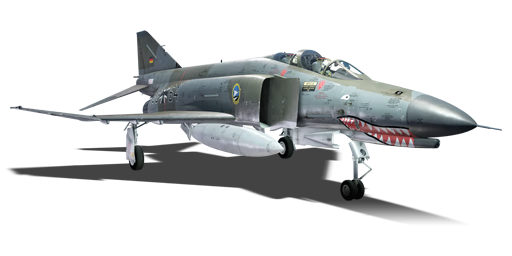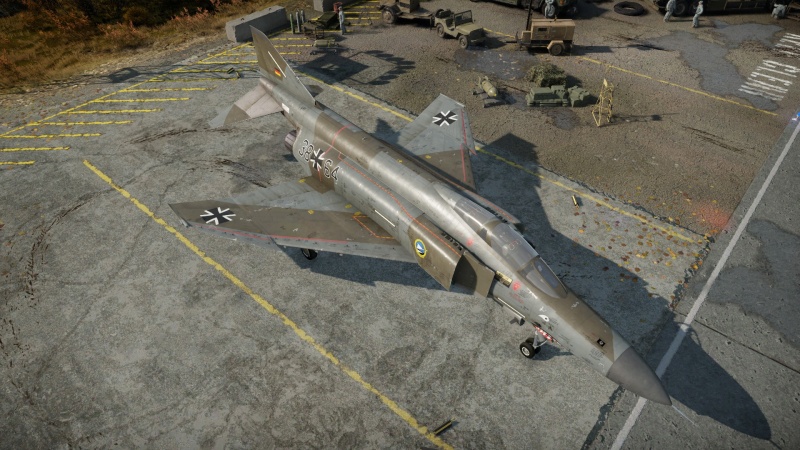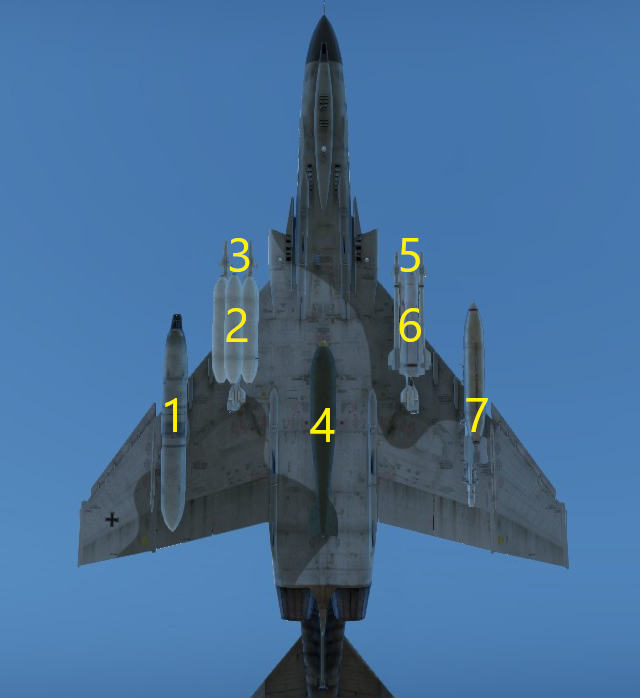F-4F Early (Germany)
| This page is about the German jet fighter F-4F Early (Germany). For other versions, see F-4 Phantom II (Family). |
Contents
Description
Developed exclusively for the German Luftwaffe, the ◄F-4F Phantom II (Early) was intended to be a cheaper and lighter version of the F-4E. At the time, Germany considered alternative fighters like a single-seat version of the F-4 and the Mirage F1 but ultimately chose the regular 2-seater Phantom for budget reasons. To keep the cost down, the ability to utilize the Sparrow missile was removed, the number 7 fuel tank was removed (most aft position), and more modifications were done to reduce weight and cost. Ultimately, the F-4F Early was around 3,300 pounds (1,496 kg) lighter than a normal F-4E and deliveries began in late 1973.
Introduced during the Update "Ixwa Strike" as a high-tier reward for the Future Technology event, the F-4F Early is one of the lowest BR Phantoms in-game, second only to the F-4C Phantom. The F-4F Early has significant improvements over the F-4C such as an internal gun, and access to AIM-9Js. However, it also lacks any ability to use guided weapons like Bullpups or Mavericks due to the removal of those systems in real life.
General info
Flight performance
| Characteristics | Max Speed (km/h at 12,192 m) |
Max altitude (metres) |
Turn time (seconds) |
Rate of climb (metres/second) |
Take-off run (metres) | |||
|---|---|---|---|---|---|---|---|---|
| AB | RB | AB | RB | AB | RB | |||
| Stock | 2,066 | 2,020 | 16000 | 26.5 | 27.8 | 162.3 | 152.4 | 850 |
| Upgraded | 2,197 | 2,126 | 25.5 | 26.0 | 236.1 | 204.9 | ||
Details
| Features | |||||
|---|---|---|---|---|---|
| Combat flaps | Take-off flaps | Landing flaps | Air brakes | Arrestor gear | Drogue chute |
| ✓ | ✓ | ✓ | ✓ | ✓ | ✓ |
| Limits | ||||||
|---|---|---|---|---|---|---|
| Wings (km/h) | Gear (km/h) | Flaps (km/h) | Max Static G | |||
| Combat | Take-off | Landing | + | - | ||
| 1458 | 463 | 607 | 580 | 463 | ~11 | ~4 |
| Optimal velocities (km/h) | |||
|---|---|---|---|
| Ailerons | Rudder | Elevators | Radiator |
| < 810 | < 750 | < 700 | N/A |
Engine performance
| Engine | Aircraft mass | |||||
|---|---|---|---|---|---|---|
| Engine name | Number | Basic mass | Wing loading (full fuel) | |||
| MTU Aero Engines J79-MTU-17A | 2 | 14,375 kg | 398 kg/m2 | |||
| Engine characteristics | Mass with fuel (no weapons load) | Max Takeoff Weight | ||||
| Weight (each) | Type | 8m fuel | 20m fuel | 27m fuel | ||
| 1,724 kg | Afterburning axial-flow turbojet | 15,941 kg | 18,196 kg | 19,595 kg | 24,000 kg | |
| Maximum engine thrust @ 0 m (RB/SB) | Thrust to weight ratio @ 0 m (WEP) | |||||
| Condition | 100% | WEP | 8m fuel | 20m fuel | 27m fuel | MTOW |
| Stationary | 5,200 kgf | 8,008 kgf | 1.00 | 0.88 | 0.82 | 0.67 |
| Optimal | 5,200 kgf (0 km/h) |
10,170 kgf (1,400 km/h) |
1.28 | 1.12 | 1.04 | 0.85 |
Survivability and armour
Examine the survivability of the aircraft. Note how vulnerable the structure is and how secure the pilot is, whether the fuel tanks are armoured, etc. Describe the armour, if there is any, and also mention the vulnerability of other critical aircraft systems.
Modifications and economy
Armaments
| Ballistic Computer | ||||
|---|---|---|---|---|
| CCIP (Guns) | CCIP (Rockets) | CCIP (Bombs) | CCRP (Bombs) | EEGS |
| |
|
|
|
|
Offensive armament
The F-4F Early (Germany) is armed with:
- 1 x 20 mm M61A1 cannon, chin-mounted (640 rpg)
Suspended armament
The F-4F Early (Germany) can be outfitted with the following ordnance:
| 1 | 2 | 3 | 4 | 5 | 6 | 7 | ||
|---|---|---|---|---|---|---|---|---|
| 20 mm GAU-4 cannons (1,200 rpg) | 1 | 1 | ||||||
| 250 lb LDGP Mk 81 bombs | 6 | 3 | 6 | 3 | 6 | |||
| 500 lb LDGP Mk 82 bombs | 6 | 3 | 6 | 3 | 6 | |||
| 500 lb Mk 82 Snakeye bombs | 6 | 3 | 6 | 3 | 6 | |||
| 750 lb M117 cone 45 bombs | 3 | 3 | 5 | 3 | 3 | |||
| 1,000 lb LDGP Mk 83 bombs | 2 | 3 | 3 | 3 | 2 | |||
| 2,000 lb LDGP Mk 84 bombs | 1 | 1 | 1 | |||||
| 3,000 lb M118 bombs | 1 | |||||||
| BLU-27/B incendiary bombs | 1 | 2 | 1 | |||||
| FFAR Mighty Mouse rockets | 57 | 57 | 57 | 57 | 57 | |||
| Zuni Mk32 Mod 0 ATAP rockets | 12 | 12 | 12 | 12 | 12 | |||
| AIM-9B FGW.2 Sidewinder missiles | 2 | 2 | ||||||
| AIM-9E Sidewinder missiles | 1, 2 | 1, 2 | ||||||
| AIM-9J Sidewinder missiles | 2 | 2 | ||||||
| 600 gal drop tanks | 1 | |||||||
| Maximum permissible loadout weight: 7,257 kg Maximum permissible wing load: 3,000 kg Maximum permissible weight imbalance: 1,500 kg | ||||||||
| Default weapon presets | |
|---|---|
| |
Usage in battles
The aircraft is pretty heavy, rather quick in acceleration and top speed and doesn't have the best turn time. Its armament, however, is impressive. With the gun pod modification equipped, you'll fire enough lead downrange to destroy any air target. Using the phantom as a turnfighter is generally ill-advised. Therefore, try to ambush a unsuspecting enemy. Even the single 20 mm cannon will give any foe a fiery end.
Using the bombs on the F-4F usually isn't that great of an idea: the match often evolves to the later stages before you will be able to rearm, and then two situations usually occur. Situation 1 involves your team destroying more aircraft of the enemy team, leading to a victory where bombing bases turned out to not be decisive and therefore it can be argued you are a dead weight. Situation 2 is when your team is losing. After you dropped the payload and destroyed the base in situation 2, the opposite team will start to hunt down the remaining friendly players. You might be able to survive 1 or 2 enemies, but having four on our tail usually ends badly.
Any engagement will boil down to three basic situations: you find an enemy doing a head-on, you chase an enemy or you get chased by the enemy. When doing a head-on, missiles aren't very effective so don't bother using them. Keep in mind if you're fighting another phantom, that he'll often have the afterburner on, and given the engines slight downward angle, kind of "drift", which has to be taken into account before taking the shot. You usually want to fire at around 3 km during the head-on, and keep on firing either until you get a critical hit(i.e he lost tail control, wings or he is on fire) or you can hear his shells whizzing by. In either situation, break off (an aircraft with no control travelling at 600 or more km/h still has a lot of kinetic energy, and the second situation speaks for itself). Otherwise, try to get onto his tail by starting to break off before he has passed you.
If you are chasing an enemy, try to predict his movements: your shells have a high muzzle velocity, but the enemy is still a fast and therefore difficult target. Fire along the path they can possibly go through, wasting ammo but securing a (usually critical) hit. Know when to disengage, i.e rolling scissors or another enemy is engaging you.
If you are being chased by the enemy, try to be as far and as fast as possible: if you have friendly fighters nearby, try to bait the enemies towards your teammates. If you play on a map with ships that have CIWS, many players usually underestimate those systems. It doesn't give you the kill but it keeps you alive to get more kills or bait more players. If a missile is locked onto you, try to lose as little energy as possible whilst also making sure the missile won't hit. Remember that you do not have countermeasures, although unguided rockets such as FFAR Mighty Mouse or Zuni can work as makeshift flares.
The missiles on the F-4F, apart from the AIM-9J, aren't very good. the AIM-9B FGW.2 and AIM-9E both have pretty poor lock-on range, small targeting window and they can pull roughly 10 G. The AIM-9J is better, it has a higher lock-on range, a pretty large targeting window, can pull 20 G and is faster. You want to fire a missile when the enemy is close and slow. Very close targets usually don't have the time to activate countermeasures, or the countermeasures are flat out ignored. Another way of using missiles is to make the enemy lose their energy, and making them an easy target to hit with either another missile or with your cannon.
Pros and cons
Pros:
- Good performance at high altitude
- Can carry up to 12,000 lb of ordnance
- Varied and mixed armament presets allow for multipurpose usage in ground battles
- AIM-9J are one of the best missiles in game
Cons:
- Lacks countermeasures (flares/chaff)
- Lacks SARH missiles found on other Phantoms, such as the AIM-7 Sparrow
- Underwhelming performance at very low altitudes
- Lacks a Ballistic Computer
- Cannot carry more than 4 missiles
- Dodging IR missiles is harder, with its 2 engines, which make a bigger heat signature near the plane
History
In the early 1970s, West Germany was searching for a new aircraft. Multiple aircraft were considered, such as a single-seat version of the F-4, but that version of the F-4 was succeeded by the F-5 and the project lost steam in the 60s. It became active again in the early '70s when the West German government was planning to acquire single-seat Phantoms designated the F-4E(F). However, this procurement fell through and the government eventually finalized its decision with the 2-seater F-4E. The project was focused on making it lighter and inexpensive compared to the normal F-4E. As such, the AN/APQ-120 was simplified by removing functions for radar missiles, the rear-most fuel tank was removed, the tailplane was unslotted, and it also lacked any capability to use guided weaponry. These modifications meant the F-4F was more than 3,000 pounds (1,360 kg) lighter than a normal F-4E and significantly cheaper.
175 F-4Fs were ordered by the West German government and many parts were manufactured within Germany such as the J-79 engines. Deliveries began in September of 1973 and ended 7 months later in April. Some of the Phantoms were sent to squadrons that fulfilled the interceptor role while other Phantoms were sent to ground-attack-focused squadrons like JBG-35. In the early 1980s, many of the F-4Fs were upgraded to fire Sparrows and guided weaponry like Mavericks. These Phantoms would later undergo the ICE program which further increased the capability of the F-4Fs.
Media
- Skins
See also
- Aircraft of comparable role, configuration and era
- Mikoyan-Gurevich MiG-21
- SAAB J35D
- Dassault Mirage IIIC
External links
| McDonnell Aircraft Corporation | |
|---|---|
| Jet Fighters | F2H-2 · F3H-2 |
| F-4C Phantom II · F-4E Phantom II · F-4J Phantom II · F-4S Phantom II | |
| F-15A · F-15C MSIP II · F-15E | |
| Strike Aircraft | AV-8B Plus · AV-8B (NA) |
| Helicopters | AH-6M |
| Export/Licensed | |
| Aircraft | ◄F-4F Early · ◄F-4F · ◄F-4F KWS LV · Phantom FG.1 · Phantom FGR.2 · F-4J(UK) Phantom II · F-4EJ Phantom II · F-4EJ ADTW · Kurnass · Kurnass 2000 |
| F-15J · F-15J(M) · Baz · Baz Meshupar · F-15I Ra’am | |
| ▄AV-8B Plus | |
| Helicopters | Lahatut |
| The McDonnell Aircraft Corporation merged with Douglas Aircraft Company in 1967 to form McDonnell Douglas Corporation. Later it was merged with The Boeing Company in 1997. | |
| See Also | Mitsubishi Heavy Industries |
| Germany jet aircraft | |
|---|---|
| |
Luftwaffe |
| He 162 | He 162 A-1 · He 162 A-2 |
| Me 163 | Me 163 B · Me 163 B-0 |
| Ho 229 | Ho 229 V3 |
| Ar 234 | Ar 234 B-2 · Ar 234 C-3 |
| Me 262 | Me 262 A-1a · Me 262 A-1a/Jabo · Me 262 A-1a/U1 · Me 262 A-1/U4 · Me 262 A-2a |
| Me 262 C-1a · Me 262 C-2b | |
| |
LSK |
| Fighters | ◊MiG-15bis · ◊Lim-5P · ◊MiG-19S |
| ◊MiG-21MF · ◊MiG-21bis-SAU · ◊MiG-21 "Lazur-M" | |
| ◊MiG-29 | |
| Attackers | ◊MiG-23BN · ◊MiG-23MF · ◊MiG-23MLA |
| ◊Su-22UM3K · ◊Su-22M4 | |
| ◊IL-28 | |
| |
Luftwaffe |
| F-84 | ◄F-84F |
| F-86 | ◄CL-13A Mk 5 · ◄CL-13B Mk.6 · ◄F-86K |
| F-104 | ◄F-104G |
| F-4 | ◄F-4F Early · ◄F-4F · ◄F-4F KWS LV |
| G.91 | ◄G.91 R/3 · ◄G.91 R/4 |
| Tornado | ◄Tornado IDS WTD61 · ◄Tornado IDS MFG · ◄Tornado IDS ASSTA1 |
| Other | Alpha Jet A · ◄Sea Hawk Mk.100 |
| Ex-LSK | ◄MiG-21 SPS-K · ◄MiG-29G · ◄Su-22M4 WTD61 |
| |
Swiss Air Force |
| ◌Hunter F.58 · FFA P-16 | |






